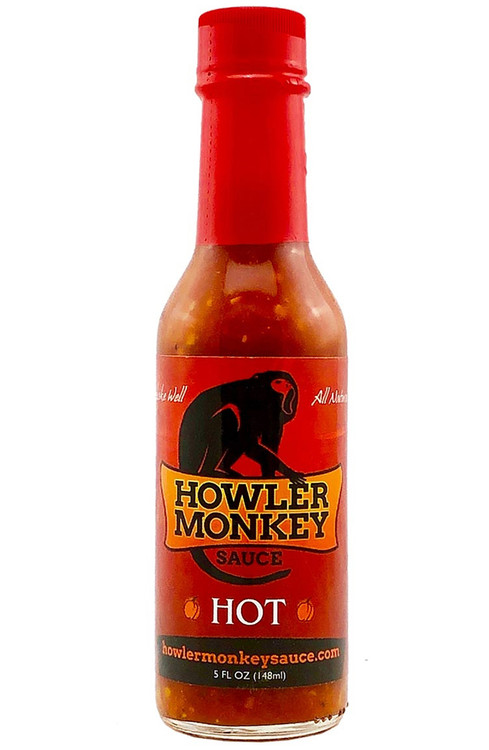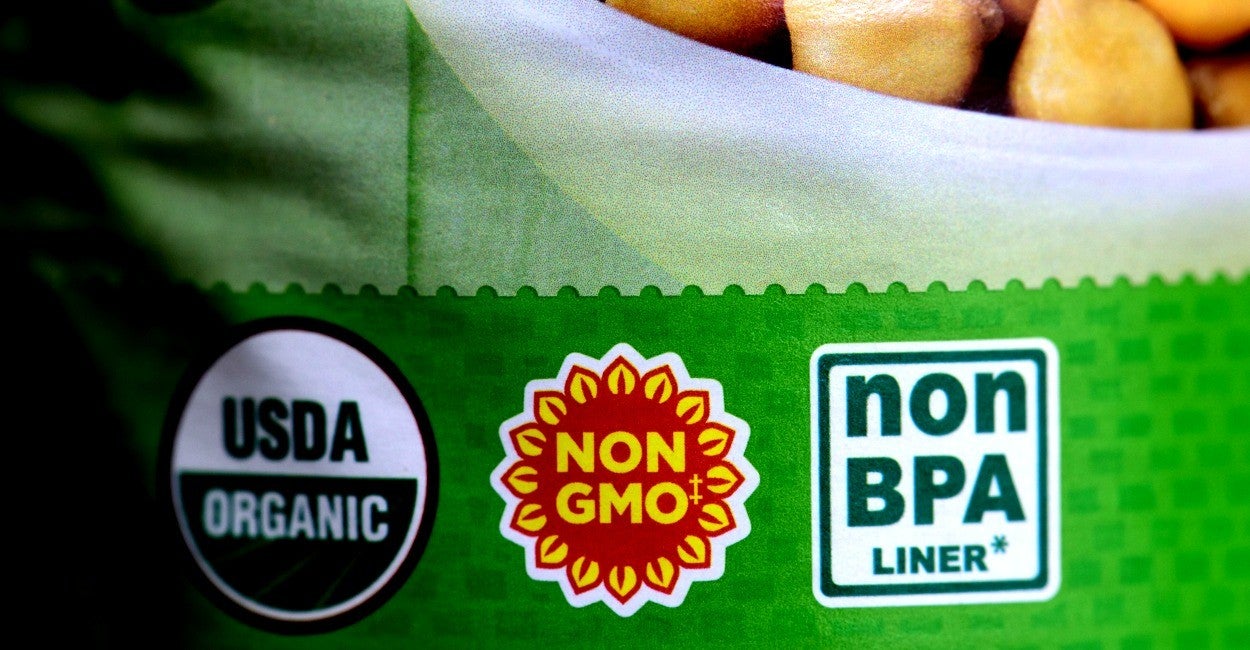41 are labels required for non gmo products
Final GMO labeling rule does not require labeling of ... Some Non-GMO Project Verified labels are extremely deceptive (although they are accurate about GMO-free status). For example, a supermarket shelf with various brands of olive oil will have a few ... How Your Food Gets The 'Non-GMO' Label : The Salt : NPR To receive the label, a product has to be certified as containing ingredients with less than 1 percent genetic modification. Westgate says that's a realistic standard, while totally GMO-free is...
Everything you need to know about GMO labeling in 2020 The law requires labeling only on bioengineered foods intended for human consumption that contain more than five percent GMO ingredients. Instances where GMOs do not have to be labeled include: Foods derived from animals, such as eggs, meat and milk Refined ingredients like oils and sugars Food served in a restaurant

Are labels required for non gmo products
GMO Foods Will Be Labeled 'Bioengineered' In 2010, the Non-GMO Project, a non-profit that verifies non-GMO food supply, started its own label for non-GMO foods and it's been adopted by thousands of retailers and manufacturers. Some states had their own rules while others didn't require the label at all. In 2014, Vermont was the first state to pass a GMO labeling law. New USDA guidance requires foods with GMO ingredients be ... Foods that had been labeled as containing "genetically modified organisms (GMOs)" will now be known as "bioengineered," or having been "derived from bioengineering," under standards set by the... Non-GMO Project Verified FAQs - The Non-GMO Project The Non-GMO Project Verified mark assures consumers that the product bearing the label has been evaluated for compliance with the Non-GMO Standard, which can be found here . The URL is also included as part of the verification mark so consumers can easily access more information about what the Non-GMO Project Standard encompasses.
Are labels required for non gmo products. BE Disclosure vs. Non-GMO Labeling | ESHA Research Non-GMO labeling, on the other hand, is neither required by law nor regulated by the FDA, except that the claim must not be deceptive. It is a voluntary declaration adopted by some companies for marketing and education purposes only. What does this have to do with the USDA Organic Standards? GMO labeling laws 2022 — Body By Amanda We're used to seeing the very clear label on food saying, "Non GMO verified" letting us know our food is free of any alterations used with GMO's. It has always been clear in the past and easy to pick out foods that didn't contain GMO's, until January 1, 2022. As of recently the FDA decided to change the labeling to "get rid of the ... Guidance for Industry: Voluntary Labeling Indicating ... FDA is providing this guidance to assist food and feed manufacturers that wish to voluntarily label their plant-derived food products or ingredients (for humans or for animals) as having been made... How GMOs Are Regulated for Food and Plant Safety in the ... FDA regulates most human and animal food, including GMO foods. In doing so, FDA makes sure that foods that are GMOs or have GMO ingredients meet the same strict safety standards as all other foods.
Non-GMO labels are on the rise in Europe - but why? Non-GMO labels are on the rise in European countries - but unlike the US, EU legislation requires all food containing above trace levels of GM to be labelled. ... In Germany, consumer concern over genetically modified foods [is] forcing the meat, dairy and egg industries to offer products derived from non-GMO feed," she said. Labeling of genetically modified products - United States ... Labeling regulations for genetically modified (GM) food products are established by Regulation 1829/2003 (articles 12-13). These rules apply to products that have undergone varying degrees of processing. The regulation does not require labeling of food products that are not food ingredients, such as processing aids. Why we need mandatory labeling of GMO products - STAT You might expect a company that creates GMO-based products would want the issue of labeling to disappear. We don't. In fact, we support mandatory labeling of all GMO products. Mandatory labeling is... Non-GMO - Consumer Reports A generic non-GMO claim isn't reliable because there are no consistent, clear, enforceable rules for using it, and there is no consistency in how the claim is verified. Learn How We Rate Food-Label...
Non-GMO Project Labels - Local Food Program Non-GMO Project Labels By James M Wolff | July 7, 2016 Genetically Modified Organisms as related to food are whole food commodities (ie corn, tomatoes, apples,) that have altered genetic information. Everything that is alive (ie "organism") has genetic information that gives instructions about how to grow, reproduce, and interact with the world. GMO Labeling Laws per Country - Global Food Safety Resource Due to the lack of concrete evidence proving that genetically modified foods are indeed detrimental to health, many countries do not have mandatory GMO labeling laws in place. GMO Labeling Laws If you look at the table below, only three countries implement a complete and total ban of genetically engineered (GE) food both imported and cultivated. Preparing for GMO labeling in 2022 | 2020-12-23 | Food ... "To be clear, all non-organic ingredients allowed in the 5% or 30% non-organic portion of organic-certified products must be non-GMO," Ms. Kuler said. The NBFDS states organic certification... GMO Foods Should be Labeled | Down to Earth Organic and ... Consumers have the right to choose what foods to eat and feed their families. This Non-GMO logo enables consumers to exercise this right! We get to exercise this right only with products from manufacturers that voluntarily comply with the Non-GMO Project's standards. In contrast, GMO labeling should be required on all food packaging. GMO ...
GMO Foods Should be Labeled, But Not for Safety: Bioethicist The fight over labeling is not confined to those who are selling GMO or non-GMO products. Vermont passed a law last year requiring labeling of genetically modified food. Maine and Connecticut have ...
Labeling of Genetically Modified Foods - 9.371 - Extension Whether or not to require labeling of food produced from crops that are genetically modified (GM) using recombinant DNA technology is a key issue in the ongoing debate over the risks and benefits of using biotechnology in agriculture. The U.S. government regulates GM food technologies, but once GM crops are approved they are considered to be 'substantially equivalent' to their conventional ...
Verification FAQs - The Non-GMO Project Non-GMO Project Verified is the fastest growing label in the natural products industry, representing over $26 billion in annual sales and more than 50,000 Verified products for over 3,000 brands. Non-GMO products are in demand and the Non-GMO Project Verified seal is the most trusted non-GMO label among consumers.
Non-GMO Project Verified - Consumer Reports Non-GMO Excellent Verification Behind Our Ratings: Food-Label Seals & Claims Consumer Reports takes a detailed look at the requirements, definitions, standards, and verification procedures behind...
Study suggests new US GMO labeling law likely to have ... The Non-GMO Project charges food companies a fee to place a non-GMO verified label on their product — even if no GM version of the food exists. However, they do not expect the new US bioengineering labeling to have much of an international effect.
USDA releases final GMO labeling rules - Alliance for Science The US Department of Agriculture has announced its final rule for labeling products made with genetically engineered (GMO) ingredients, which will now be called "bioengineered." In a win for farmers, the new rule states that no disclosure is required on refined foods such as vegetable oils and sugar if the modified genetic material is undetectable.
New Allowances for Including a "Non-GMO ... - USDA Organic meat and poultry producers can now use a streamlined process to get approval for labels verifying that their products do not include genetically engineered (GE) ingredients. These products may also now use a "Non-GMO" label claim. Because of this, we're updating a previous blog from our "Organic 101" series. In 2014, USDA's Food Safety and Inspection Service (FSIS ...
The Truth Behind GMO Labeling - GMO Answers The non-GMO label means a food product contains fewer than 1% of genetically modified ingredients. Because of this, food labeled non-GMO is not legally considered GMO-free. GMOs (genetically modified organisms) are crops that have been created to produce more desirable traits. Non-GMO labels can differ in other countries.
What Does the Non-GMO Label Mean? - Safer® Brand There is no federal agency to enforce Non-GMO labels. There is the Non-GMO Project, which is an independent organization that awards its labels to those that meet its standards. BANS GMOs? - Both the USDA's organic-certified products and those carrying the Non-GMO Project label do not permit GMOs to be in any part of the product.
GMO Labeling | Science of GMOs Non-GMO Project Verified products must meet a threshold of no more than about 0.9 percent GE content, by weight, which is similar to the EU's threshold for mandatory labeling of processed foods made with GE ingredients. To verify that non-GE ingredients are used, traceability and segregation of inputs are also required.
Non-GMO Project Verified FAQs - The Non-GMO Project The Non-GMO Project Verified mark assures consumers that the product bearing the label has been evaluated for compliance with the Non-GMO Standard, which can be found here . The URL is also included as part of the verification mark so consumers can easily access more information about what the Non-GMO Project Standard encompasses.
New USDA guidance requires foods with GMO ingredients be ... Foods that had been labeled as containing "genetically modified organisms (GMOs)" will now be known as "bioengineered," or having been "derived from bioengineering," under standards set by the...
GMO Foods Will Be Labeled 'Bioengineered' In 2010, the Non-GMO Project, a non-profit that verifies non-GMO food supply, started its own label for non-GMO foods and it's been adopted by thousands of retailers and manufacturers. Some states had their own rules while others didn't require the label at all. In 2014, Vermont was the first state to pass a GMO labeling law.












Post a Comment for "41 are labels required for non gmo products"